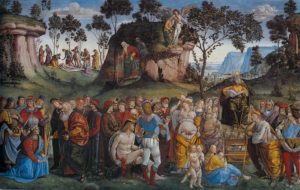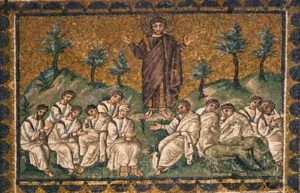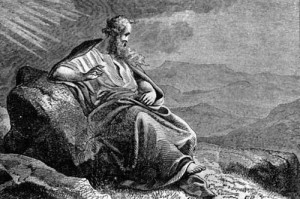Illuminations on the Lectionary readings for Feb. 12, 2023 (Epiphany 6A)
First Reading: Deuteronomy 30:15-20
Our Lectionary readings for recent Sundays have followed a consistent theme: In the Gospels we are hearing Matthew’s account of Jesus’s teaching in the Sermon on the Mount.

Moses Shown the Promised Land (1801), oil painting on panel by Benjamin West (1738-1820). The Metropolitan Museum of Art, New York City. (Click image to enlarge)
In our Hebrew Bible readings we have glimpsed the roots of Jesus’s wisdom in God’s firm commandments to be righteous, to care for the poor and the oppressed; the widow, the orphan and the stranger in our land. Our first reading shows Moses instructing the people at the end of their long journey in the desert, as they prepare to cross the Jordan into the Promised Land. They hear the core of the covenant at Sinai: Follow God’s commandment to be righteous, and inherit the land. Defy God’s commandments, fail in that covenant, and – as the prophets will foretell – lose the land and die.
Alternate First Reading: Sirach 15:15-20
In this optional alternative for the first reading we hear a passage from Sirach (also known as Ecclesiasticus), one of the books known as Apocrypha that were originally written Greek, not Hebrew, and that come at the end of editions of the Hebrew Bible that choose to include them. Consistent with the day’s other readings, it sums up God’s teaching in brisk, memorable advice: We are given free will. God does not force us to keep the commandments – we may choose either fire or water – but God, all-knowing and wise, does not wish us to sin.
Psalm: Psalm 119:1-8
Psalm 119, the longest of all the Psalms, devotes its 176 verses to a consistent message: God’s decrees, God’s law and teaching given in the Torah, are wonderful, and following them brings joy. The ideas that the Psalmist expresses in these first eight verses of the Psalm will continue throughout. They echo the covenant between God and Moses at Mount Sinai: Those who follow God’s teaching and walk in God’s ways will be rewarded. The Psalmist calls on God’s help to stay steadfast in following this teaching, and begs in turn not to be forsaken.
Second Reading: 1 Corinthians 3:1-9
We continue working through the opening chapters of First Corinthians this week, listening in as Paul writes pastorally to a bickering church that has split into factions. In last Sunday’s portion Paul might have seemed to be praising the Corinthians for a spiritual maturity that enabled them to understand the ways of God that aren’t so clear to those less mature. But now Paul makes it clear that the Christians of Corinth have a long way to go. Their quarreling factions show that they aren’t ready for spiritual food, Paul warns, adding that we are all God’s servants. When we work together, God uses us to build and grow.
Gospel: Matthew 5:21-37
In the Sermon on the Mount, which occupies three full chapters of Matthew’s Gospel, we learn much about discipleship, the hard work of following Jesus toward the Kingdom of God. Last Sunday we heard Jesus assure the crowd that he did not come to change the Law and the Prophets (that is, the Hebrew Bible). But now he begins interpreting the Law – as rabbis do – in new and challenging ways. Considering the commandment, “Do not kill,” Jesus says to go beyond that. Not only must we do no harm but we must even respond to our enemies in peace. We are not merely bound to not commit adultery, but to treat women with respect. We must do more than simply avoiding false witness: We are called to be honest, be true, say exactly what we mean!



